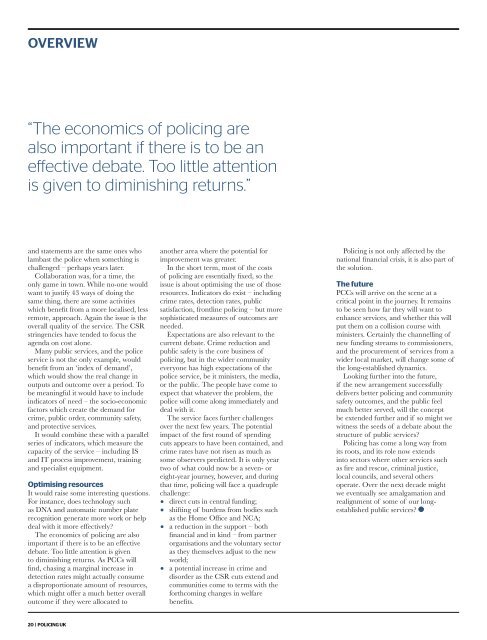Policing UK 2013 - Police Federation
Policing UK 2013 - Police Federation
Policing UK 2013 - Police Federation
Create successful ePaper yourself
Turn your PDF publications into a flip-book with our unique Google optimized e-Paper software.
OVERVIEW<br />
“The economics of policing are<br />
also important if there is to be an<br />
effective debate. Too little attention<br />
is given to diminishing returns.”<br />
and statements are the same ones who<br />
lambast the police when something is<br />
challenged – perhaps years later.<br />
Collaboration was, for a time, the<br />
only game in town. While no-one would<br />
want to justify 43 ways of doing the<br />
same thing, there are some activities<br />
which benefit from a more localised, less<br />
remote, approach. Again the issue is the<br />
overall quality of the service. The CS<br />
stringencies have tended to focus the<br />
agenda on cost alone.<br />
Many public services, and the police<br />
service is not the only example, would<br />
benefit from an ‘index of demand’,<br />
which would show the real change in<br />
outputs and outcome over a period. To<br />
be meaningful it would have to include<br />
indicators of need – the socio-economic<br />
factors which create the demand for<br />
crime, public order, community safety,<br />
and protective services.<br />
It would combine these with a parallel<br />
series of indicators, which measure the<br />
capacity of the service – including IS<br />
and IT process improvement, training<br />
and specialist equipment.<br />
Optimising resources<br />
It would raise some interesting questions.<br />
For instance, does technology such<br />
as DNA and automatic number plate<br />
recognition generate more work or help<br />
deal with it more effectively<br />
The economics of policing are also<br />
important if there is to be an effective<br />
debate. Too little attention is given<br />
to diminishing returns. As PCCs will<br />
find, chasing a marginal increase in<br />
detection rates might actually consume<br />
a disproportionate amount of resources,<br />
which might offer a much better overall<br />
outcome if they were allocated to<br />
another area where the potential for<br />
improvement was greater.<br />
In the short term, most of the costs<br />
of policing are essentially fixed, so the<br />
issue is about optimising the use of those<br />
resources. Indicators do exist – including<br />
crime rates, detection rates, public<br />
satisfaction, frontline policing – but more<br />
sophisticated measures of outcomes are<br />
needed.<br />
Expectations are also relevant to the<br />
current debate. Crime reduction and<br />
public safety is the core business of<br />
policing, but in the wider community<br />
everyone has high expectations of the<br />
police service, be it ministers, the media,<br />
or the public. The people have come to<br />
expect that whatever the problem, the<br />
police will come along immediately and<br />
deal with it.<br />
The service faces further challenges<br />
over the next few years. The potential<br />
impact of the first round of spending<br />
cuts appears to have been contained, and<br />
crime rates have not risen as much as<br />
some observers predicted. It is only year<br />
two of what could now be a seven- or<br />
eight-year journey, however, and during<br />
that time, policing will face a quadruple<br />
challenge<br />
direct cuts in central funding<br />
shifting of burdens from bodies such<br />
as the Home Office and NCA<br />
a reduction in the support – both<br />
financial and in kind – from partner<br />
organisations and the voluntary sector<br />
as they themselves adjust to the new<br />
world<br />
a potential increase in crime and<br />
disorder as the CS cuts extend and<br />
communities come to terms with the<br />
forthcoming changes in welfare<br />
benefits.<br />
<strong>Policing</strong> is not only affected by the<br />
national financial crisis, it is also part of<br />
the solution.<br />
The future<br />
PCCs will arrive on the scene at a<br />
critical point in the journey. It remains<br />
to be seen how far they will want to<br />
enhance services, and whether this will<br />
put them on a collision course with<br />
ministers. Certainly the channelling of<br />
new funding streams to commissioners,<br />
and the procurement of services from a<br />
wider local market, will change some of<br />
the long-established dynamics.<br />
Looking further into the future,<br />
if the new arrangement successfully<br />
delivers better policing and community<br />
safety outcomes, and the public feel<br />
much better served, will the concept<br />
be extended further and if so might we<br />
witness the seeds of a debate about the<br />
structure of public services<br />
<strong>Policing</strong> has come a long way from<br />
its roots, and its role now extends<br />
into sectors where other services such<br />
as fire and rescue, criminal justice,<br />
local councils, and several others<br />
operate. Over the next decade might<br />
we eventually see amalgamation and<br />
realignment of some of our longestablished<br />
public services<br />
20 | POLICING <strong>UK</strong>
















